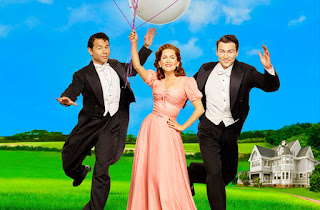Sweet Charity at
the Signature Center
Shuler Hensley and Sutton Foster in Sweet Charity.
They don’t
make ‘em like Charity Hope Valentine, the feisty, resolutely optimistic dance
hall hostess at the center of Sweet
Charity, anymore, nor do they make ‘em like Sutton Foster, the complete
package of the musical comedy star, so it is perhaps fated that the two should
meet at the New Group’s stage at the Pershing Square Signature Center, now
through January 8th. It was
equally inevitable given the ingredients – a score that produced at minimum two
of the greatest songs in the history of musical theater, and a star who has
proven herself the only stage actress alive who can hold a candle to Merman,
Ball, and Holliday – that it would be good.
What was by no means expected was how extraordinary it would turn out to
be.
This Sweet Charity, directed by Leigh
Silverman and choreographed by Joshua Bergasse in its first off-Broadway
outing, is, to be fair, really good for many reasons. It’s rooted so deeply in the late ‘60s, for
one thing, that it feels at least as accurate as Hair (from which it borrows liberally but appropriately in its almost unnecessary “Rhythm of Love”
sequence) in its amalgamation of subculture and moral deterioration. Its male lead, Shuler Hensley, and effective
one-man ensemble, Joel Perez, make the near-impossible but imperative leap from
ridiculous to pathos that grounds this musical comedy in the darkness that
makes it unique. And it’s pretty
enormously goddamned fun, in its shockingly intimate staging in a 200-seat
theater that injects the proceedings with immediacy, then jolts the evening
into full gear with the triple-whammy to end all triple-whammies: Neil Simon’s
book, one of the few of the era to be truly funny and dramatically satisfying,
plus Dorothy Fields’ witty lyrics and Cy Coleman’s effortlessly cool score.
But, then,
to be honest: It’s good because of Sutton Foster. It is perhaps a cliché, leftover from movies
of the ‘40s and ‘50s about musicals of the ‘40s and ‘50s, for a well-to-do
audience to leave a theater gushing of the leading lady, “Oh, she can do
anything.” This is not actually true of
most of the more prominent female stars on today’s Broadway stages. It is true of Ms. Foster. She is as good here as it is possible for her
to be, and, as with every time she plays a role, she plays it better than it’s
ever been played and sings the songs better than they’ve ever been sung and justifies
the show’s existence by playing in it. I’ve
heard that this is a role she’s wanted to play for a long time, but it’s
impossible to say why retrospectively since it was never big enough for her until
she played it. She leaps, she belts, she
leaves the audience in hysterics – in short, she towers. We are lucky – lucky, do you hear me – to be living at the same time she’s
performing. When I saw her do Anything Goes on Broadway in 2011, I
thought definitively that it was the greatest performance she was ever likely
to give. I was wrong. It’s this one. Until the next one.
“If My
Friends Could See Me Now,” one of those two best songs I mentioned earlier (the
other, incidentally, is “Big Spender”), comes near the middle of the first act,
when Charity is left, briefly, alone by her host, a charming Italian film star,
in his opulent apartment. Charity revels,
exults, crows – and when Sutton Foster does it, so do you. There are tap shoes, a hat, a cane, and a
practically bare proscenium – and it’s the best stage sequence I’ve seen in a
long time, or maybe ever. The other day,
I listened to “If My Friends Could See Me Now” again, not even really thinking
about Ms. Foster. I made it almost until
the final few bars, when I recalled, as the triumphant notes sounded, Ms.
Foster’s Charity falling ecstatically backward onto a chaise. I’m not even ashamed to admit that I teared
up a little, given that I can build up my masculinity again in the intervening
years between now and when Sutton Foster gets back on stage. When she does, she’ll have me right where she
wants me.


